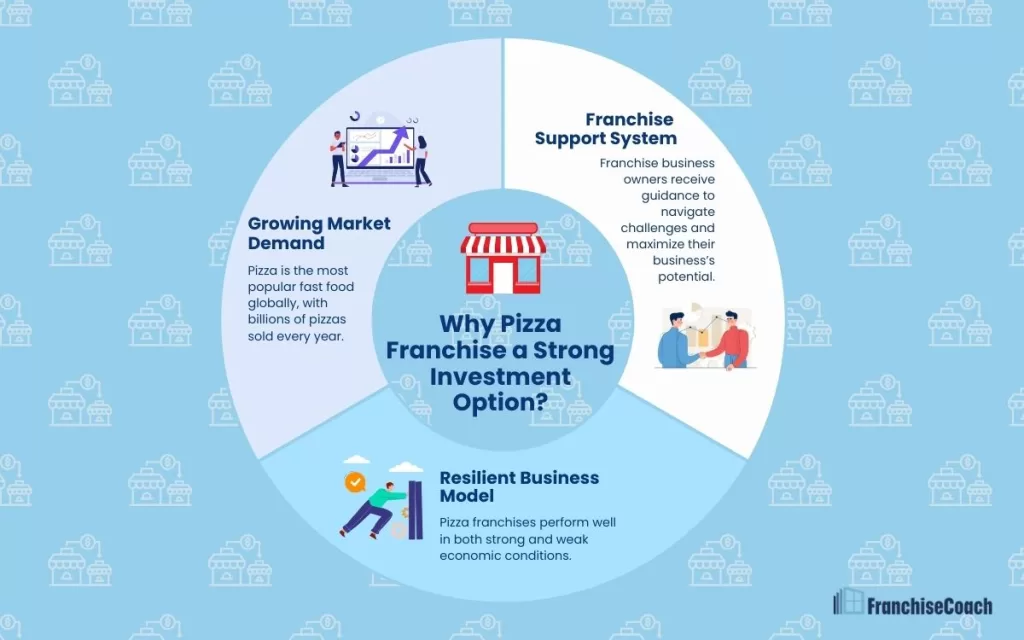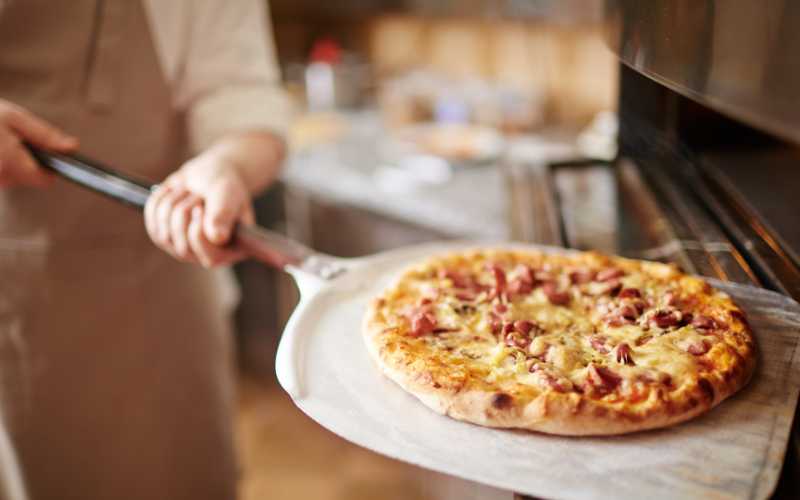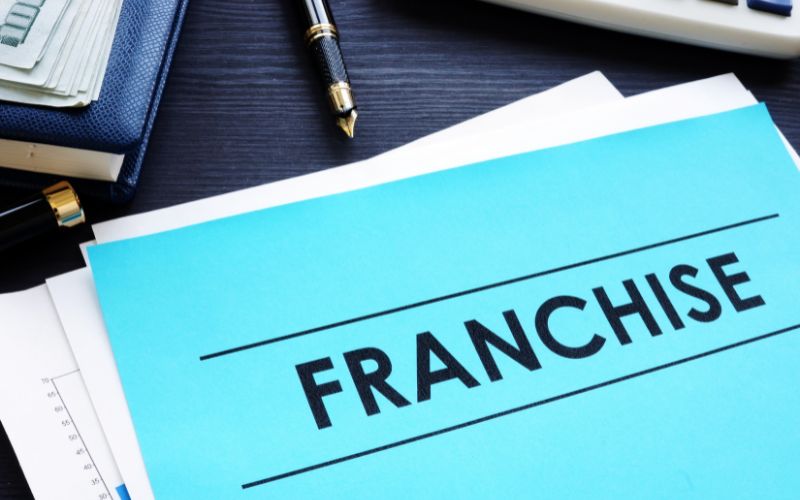Pizza Franchises + E-2 Visa = Success
Thinking about launching your American dream and serving up hot slices with one of the top pizza franchises while you’re at it? Owning a pizza franchise could be your perfect next move. For international entrepreneurs applying for the E-2 visa, pizza isn’t just comfort food—it’s a smart, scalable franchise opportunity that keeps growing.
From Jet’s Pizza in Michigan to Blaze Pizza, opening across territories worldwide, the opportunity is hot. With a strong brand, a bit of liquid capital, and the right mindset, investing in a pizza restaurant can lead to long-term success in the U.S. restaurant industry.
Here’s what makes pizza such a smart franchise investment, especially for E-2 visa applicants.
Why Pizza Still Wins in the Restaurant Industry

Pizza is one of the most consistent winners in the food world. Americans eat around 3 billion pizzas yearly, and that number isn’t slowing down. In 2024 alone, U.S. pizza restaurants generated over 50 billion dollars in revenue. Globally, the pizza industry is expected to grow by more than 70 billion between 2025 and 2029.
It’s simple. People love pizza. They trust it. They want it fast, hot, and at a fair price.
And that’s what pizza franchises deliver.
A Proven, Resilient Business Model
Whether the economy is strong or shaky, people keep ordering pizza. During tough times, families turn to affordable, filling meals. And when things are good? Pizza still gets the call. It’s always relevant.
Fast-growing pizza franchises like Blaze Pizza and Little Caesars have adapted to modern delivery systems, carryout options, and digital ordering. The result is a business that runs lean, stays competitive, and continues to meet customer demand.
Why Pizza Franchises Work So Well for E-2 Visa Investors

The E-2 visa is designed for hands-on business owners who make a real investment and create jobs. A pizza franchise checks every box.
Let’s look at four key reasons why this kind of franchise opportunity is a great fit.
1. Financial Investment and Ownership
Starting a pizza franchise requires a real financial commitment. Depending on the brand and location, startup costs usually range from $175,000 to $750,000. It includes equipment, buildout, inventory, and more.
Top names like Pizza Hut, Jet’s Pizza, and Little Caesars outline financial expectations clearly in their Franchise Disclosure Document (FDD). This legal document spells out everything from the franchise fee to startup support. It also helps investors understand the requirements in terms of liquid capital and long-term commitment.
For the E-2 visa, this kind of structured investment is what immigration officials are looking for.
2. Hands-On Involvement and Business Growth
To qualify for the E-2 visa, investors must actively manage their business. You can’t just write a check and walk away.
With a pizza franchise, you’re in the mix every day. That means managing staff, monitoring inventory, overseeing day-to-day operations, keeping food at safe temperatures, and ensuring the store meets brand standards.
Franchises like Blaze Pizza offer strong franchise development programs that guide you every step of the way. You don’t have to invent the system. You have to run it well.
3. Ownership and Operational Control

E-2 visa holders own at least 50 percent of the business and play a role in running it.
That’s what franchise owners do. They lead hiring and training, monitor the restaurant’s financial health, and make key decisions around marketing and growth. Whether you’re running one store in Ohio or planning an expansion into South Carolina, you’re in charge.
You also benefit from the brand’s built-in support systems, which include training, national advertising, and access to proven tools. This structure gives you more time to focus on what matters most—customers, employees, and long-term success.
4. Job Creation and Community Impact
Pizza franchises are great for building teams. Every restaurant needs staff—kitchen workers, delivery drivers, shift leaders, and managers.
As a franchisee, you’re creating local jobs and supporting nearby vendors. That means you’re contributing to the community and checking another E-2 visa box: economic impact.
Many franchise systems help with recruitment and training. They’ll even assist you with retaining talent by providing onboarding systems and career development programs.
When franchisees grow into multi-unit operators, their impact grows, too. That’s great for the community—and for your visa application.
What Makes an Ideal Pizza Franchise Candidate?

You don’t need restaurant experience, but you do need to be hands-on, driven, and willing to follow a proven system. The ideal candidate has:
- Access to the required liquid capital
- A desire to manage daily operations
- Strong leadership and people skills
- A long-term vision for owning a successful business
If that sounds like you, there’s real potential here.
What to Know Before You Invest in a Pizza Franchise
Not all pizza franchises are created equal. While the core product might be the same—cheese, dough, sauce, toppings—how the business operates behind the scenes can vary significantly from one brand to another.
Some franchises require more startup capital or liquid capital up front, while others are known for offering better franchise development support, more favorable territories, or strong brand recognition.
Choosing the right franchise opportunity isn’t just about liking the pizza. It’s about aligning with a franchise system that gives you the tools to succeed—and the room to grow.
Before you sign any agreement or fill out your E-2 visa paperwork, take time to evaluate a few key areas:
1. Review the Franchise Disclosure Document (FDD)

The Franchise Disclosure Document FDD is your roadmap. It outlines everything from the franchise fee and ongoing royalties to your operational obligations and training support.
Don’t skip this step. Whether you are considering Jet’s Pizza, Little Caesars, or Pizza Hut, it is essential to carefully review the terms to understand what you’re committing to. Ideally, discuss it with a franchise consultant who can identify red flags and interpret the fine print.
2. Assess Location and Market Potential
The location of your pizza restaurant impacts your business success. Some franchises have open territories in states like Indiana, Kansas, South Dakota, and New Mexico, or saturated areas like Ohio or Wisconsin. Look for cities or regions with strong population growth, limited direct competition, and high demand for quick-service dining.
Your success hinges on how well your location fills a need in the community, whether that’s late-night delivery for college students or family-friendly dine-in experiences.
3. Understand the Brand’s Ingredients and Quality Standards
Today’s consumers care about what’s in their food. Fresh ingredients, high-quality cheese, handcrafted dough, and flavorful sauce can set your pizza apart. Some brands cut corners. Others make food quality a central part of their mission and marketing.
Never assume every pizza franchise delivers the same product. Try the food. Visit existing stores. Talk to other franchisees about what customers say. If people rave about the crust or ask for extra toppings, that’s a good sign.
4. Gauge Customer Experience and Reputation
A pizza is only as good as the experience that comes with it. How quickly is the food prepared? Are customers greeted warmly? Are reviews on Google and Yelp generally positive?
Strong customer service and consistent delivery are what separates the best franchises from the rest. Look for brands that have earned loyalty over time and prioritize training their teams to deliver a memorable dining experience, whether in-store, curbside, or through delivery.
5. Evaluate Marketing and Brand Strength
You’re not just buying a pizza oven—you’re buying into a brand. Does the franchise offer a clear national marketing strategy? Are they active on social media? Do they provide local marketing support or expect you to do the heavy lifting?
Industry leaders like Blaze Pizza and Pizza Hut often have national campaigns that drive traffic to franchise locations. Others may give you a marketing toolkit but leave execution up to you. Be sure you understand what kind of support you’ll get because attracting customers is job one.
6. Check the Technology Stack

Today’s customers expect easy ordering, fast delivery, and reliable service. Ensure the franchisee invests in digital tools, like online ordering platforms, loyalty apps, real-time delivery tracking, and backend systems that make operations smoother.
In a competitive restaurant industry, having the right tech can streamline labor, reduce mistakes, and give you critical insights about inventory, peak hours, and customer behavior. If the brand’s tech feels stuck in 2005, that’s a red flag.
Start Building Your Future in the U.S.
You’re not just serving food, you’re building something that lasts. With strong franchise support, growing demand, and a clear path to ownership, pizza franchises offer one of the best ways to turn your E-2 visa into a long-term win.
Whether you’re considering North Dakota, Rhode Island, or even Oregon, there’s a market ready for the next great pizza store. And there’s a franchise team ready to help you make it happen.
Explore your pizza franchise options today and take the first step toward a business that feeds your future and maybe a few million hungry customers, too.
Are you ready to invest in a thriving pizza franchise? Contact an E2 visa consultant today to explore the best pizza franchise opportunities that align with your investment goals!